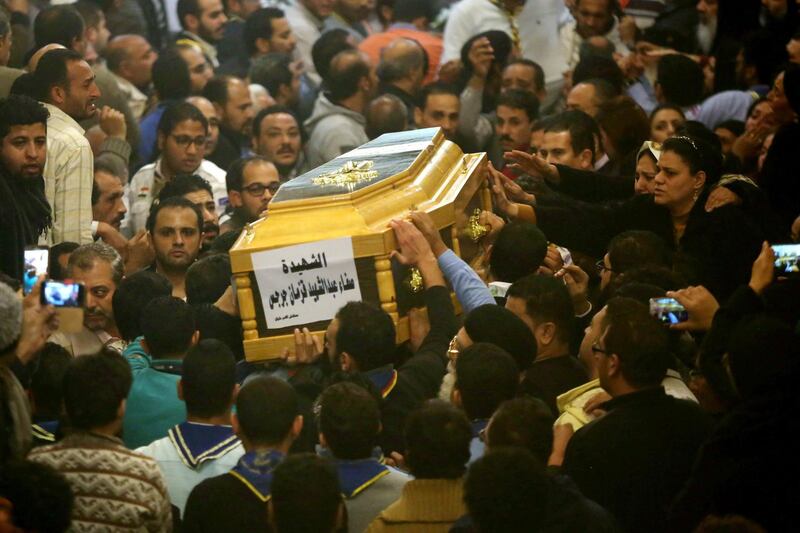Jacob Wirtschafter, cairo
Despite official reassurances, Egypt's Christian minority say they fear for their safety ahead of the Coptic celebration of Christmas this week following Friday's attack on a church near Cairo in which nine people were killed.
Underlining their concern, the interior ministry announced late on Saturday that 14 men had been arrested for plotting attacks during Christmas. The ministry said the men, who were detained in different provinces, were part of a conspiracy directed by an armed wing of the outlawed Muslim Brotherhood to "violently disrupt Christmas celebrations".
Friday's shooting at the Mar Mina church in Helwan came at the end of a year of unprecedented extremist violence in Egypt, much of it targeted at the 10-million strong Coptic Christian community.
"These desperate terrorist attempts will not undermine the resolve and the entrenched national unity of the Egyptian people," said Bassam Rady, spokesman for president Abdel Fattah El Sisi. "They only increase our determination to continue on the path to eliminate terrorism and extremism."
Mr El Sisi has pledged to advance Muslim-Christian coexistence and will inaugurate a cathedral in Egypt's new administrative capital during the Coptic Christmas celebration on January 7, observed according the ancient Egyptian calendar.
Sheikh Mohammed bin Zayed, Crown Prince of Abu Dhabi and Deputy Supreme Commander of the UAE Armed Forces, phoned Mr El Sisi on Friday night to offer condolences for the victims of the attack.
Sheikh Mohammed reaffirmed the UAE's solidarity with Egypt and support in standing up against the scourge of terrorism, state news agency Wam reported.
ISIL claimed the attack in a statement released via its propaganda agency Amaq, but its account conflicted with those of officials and witnesses.
The extremist group said one attacker was killed when "soldiers of the caliphate attacked Christian worshippers" but Egyptian security sources mentioned only one attacker, who was shot and wounded by one of the three policemen guarding the church. Witnesses at the church said there may have been up to three attackers.
The security sources said the attacker was a known terrorist and identified him as Ismail Ismail Mustafa, a 33-year-old metalworker and former resident of Helwan.
Ahmed El Tayyeb, the grand imam of Al Azhar, the chief centre of Sunni Islamic law and theology, condemned the attack and called on Muslims to join Copts in their Christmas celebrations.
However, the shaken Christian community is less confident in the security establishment and uncertain if the leadership's vision of coexistence can come to fruition in a region witnessing a surge in inter-religious hatred and violence.
"The incident was a rehearsal to attack us on Christmas," said Sayed Riad, 48, a car salesman in Helwan. "We do not know what will happen in the holiday or at the administrative capital. We do know that the government has told us that they have increased security."
Egypt’s interior ministry has said it was deploying 230,000 security personnel to protect the country’s 2,626 churches.
"But it doesn't feel like that when you live next door to a church that has been attacked," said Mr Riad.
Hassan Mohammed, a 23-year-old rickshaw driver in Helwan, said Muslims in the area were as frightened as their Christian neighbours and that many came to the aid of the victims of the church shooting.
“I saw a little girl whose mother was on the ground and shot,” Mr Mohammed said. “I put the mom and other injured in the first car we could find to take them to the hospital.”
He said the sheikh at the nearby Dasouki mosque used its loudspeaker to warn people about the attacker.
But Ishaak Ibrahim, a Copt and chief religious minorities researcher at the Egyptian Initiative for Personal Rights, a human rights group, said anti-Christian sentiment had penetrated sectors of society that do not consider themselves extremist or ISIL supporters.
"Last Friday, villagers in Atfieh [about 80 kilometres south of Helwan] stormed a property that had been used as a place of worship by Christians. Muslims heard a rumour that church bells were to be installed atop the house where their Christian neighbours assembled for prayer," he said.
He recited a litany of attacks on Christians this year, including the fatal stabbing of a priest in October, the killing of 28 pilgrims travelling to a monastery near the city of Minya in May, the Palm Sunday bombings at two churches in Alexandria and Tanta that killed 43 people in April, and the murders of seven Christians in El Arish by ISIL's Sinai-based Egyptian affiliate in February resulted in the mass exodus of hundreds of Christians from the northern part of the peninsula.
"There is a connection between the attack in Atfieh and this bloody assault," Mr Ibrahim said . "We witnessed increasing attacks on Coptic Christians in 2017 and this is the just the latest in the chain."





